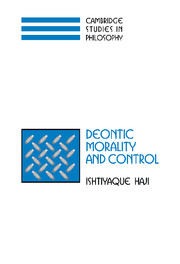Book contents
- Frontmatter
- Contents
- Acknowledgments
- 1 Introduction
- PART ONE DETERMINISM AND DEONTIC MORALITY
- PART TWO INDETERMINISM AND DEONTIC MORALITY
- PART THREE CONSEQUENCES OF BEING DEPRIVED OF DEONTIC ANCHORS
- 9 The Significance of the Possibility of Being without Deontic Anchors
- 10 Determinism, Deontic Anchors, and Appraisability
- 11 Virtue Ethics without Metaphysical Freedom
- 12 On the Connection between Morality's Dethronement and Deontic Anchors
- 13 Concluding Remarks
- Notes
- Glossary and List of Principles
- References
- Index
12 - On the Connection between Morality's Dethronement and Deontic Anchors
Published online by Cambridge University Press: 23 July 2009
- Frontmatter
- Contents
- Acknowledgments
- 1 Introduction
- PART ONE DETERMINISM AND DEONTIC MORALITY
- PART TWO INDETERMINISM AND DEONTIC MORALITY
- PART THREE CONSEQUENCES OF BEING DEPRIVED OF DEONTIC ANCHORS
- 9 The Significance of the Possibility of Being without Deontic Anchors
- 10 Determinism, Deontic Anchors, and Appraisability
- 11 Virtue Ethics without Metaphysical Freedom
- 12 On the Connection between Morality's Dethronement and Deontic Anchors
- 13 Concluding Remarks
- Notes
- Glossary and List of Principles
- References
- Index
Summary
Of all the different sorts of obligation such as prudential, legal, or moral, moral obligation has been thought by many from Plato down to several contemporary thinkers to be the most stringent or “overriding.” The moral “ought's” claim to supremacy – its claim to overridingness – it may be thought, kindles another concern with being deprived of deontic anchors. In rough strokes, the issue is this: In a world with no deontic anchors, no nonmoral variety of obligation would be overriding, as it is moral obligation that is overriding, and this sort of world is devoid of such obligation. But then there would be no ultimate standard to which one could appeal to settle what one “plain ought” to do in “conflict situations” where, for example, legal obligation conflicts with prudential obligation, or prudential obligation conflicts with duties of love. For the moral “ought” is the “overarching” ought, the standard that dictates what one plain ought to do in conflict situations, but a world without deontic anchors is a world without moral obligation. Hence, loss of deontic anchors would be accompanied by loss of an overarching standard – the final court of appeal for settling normative conflicts of the relevant sort. Consequently, practical reason would, in a manner of speaking, be “fragmented.”
Aspects of this concern ring true to me; others are rife with confusion. To sift truth from confusion, let's start with some fundamentals.
- Type
- Chapter
- Information
- Deontic Morality and Control , pp. 221 - 244Publisher: Cambridge University PressPrint publication year: 2002



